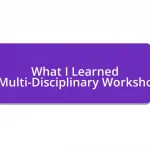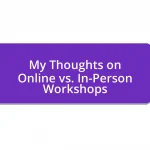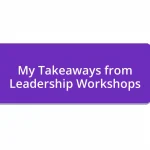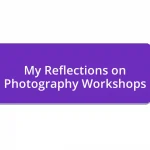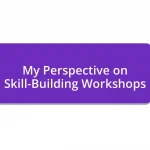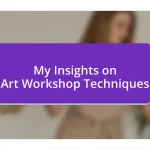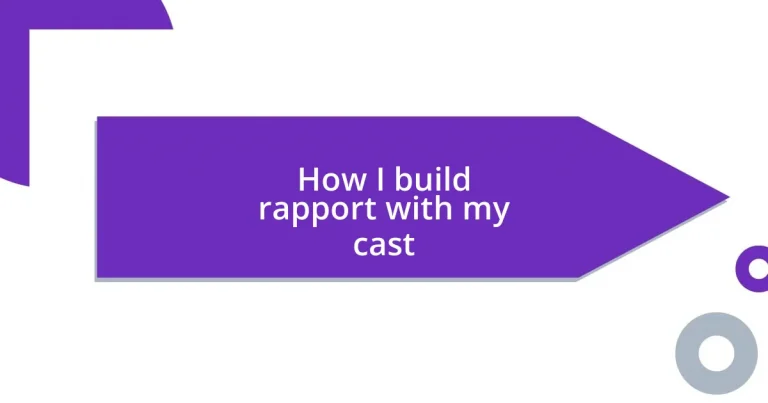Key takeaways:
- Building rapport fosters collaboration, trust, and emotional vulnerability, essential for strong performances in the arts.
- Effective communication techniques, such as active listening and positive reinforcement, enhance connection and creativity within the cast.
- Creating a feedback-friendly environment encourages open discussions, leading to collective improvements and deeper trust.
- Consistent check-ins and moments of laughter throughout production help maintain rapport and strengthen team bonds.
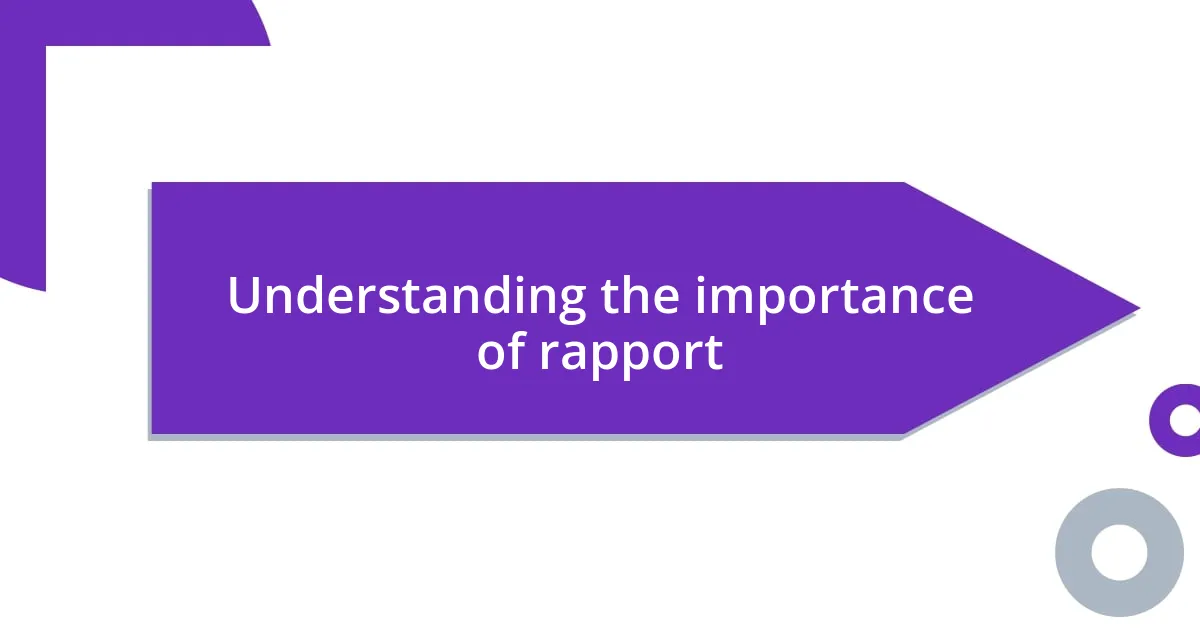
Understanding the importance of rapport
Building rapport is essential for fostering a collaborative and creative environment. I recall a production where the cast was initially apprehensive about working together. By simply sharing a meal before rehearsals, I noticed a shift in their openness and willingness to connect, which made our overall process smoother. Isn’t it fascinating how something as simple as breaking bread can lay the foundation for trust?
When there’s rapport, you create a safe space for vulnerability, which is vital in the arts. I’ve witnessed actors deliver performances with raw emotion because they felt comfortable expressing their ideas and fears. Have you ever noticed how some groups seem to intuitively understand each other? That bond often stems from the connection we nurture; trust leads to authentic performances.
Moreover, rapport doesn’t just enhance individual performances; it elevates the entire production. During one show, our backstage communication was seamless, allowing us to adapt quickly to unforeseen challenges. How do you think your interactions could change if rapport were prioritized? In my experience, when everyone feels valued and understood, magic happens on stage.
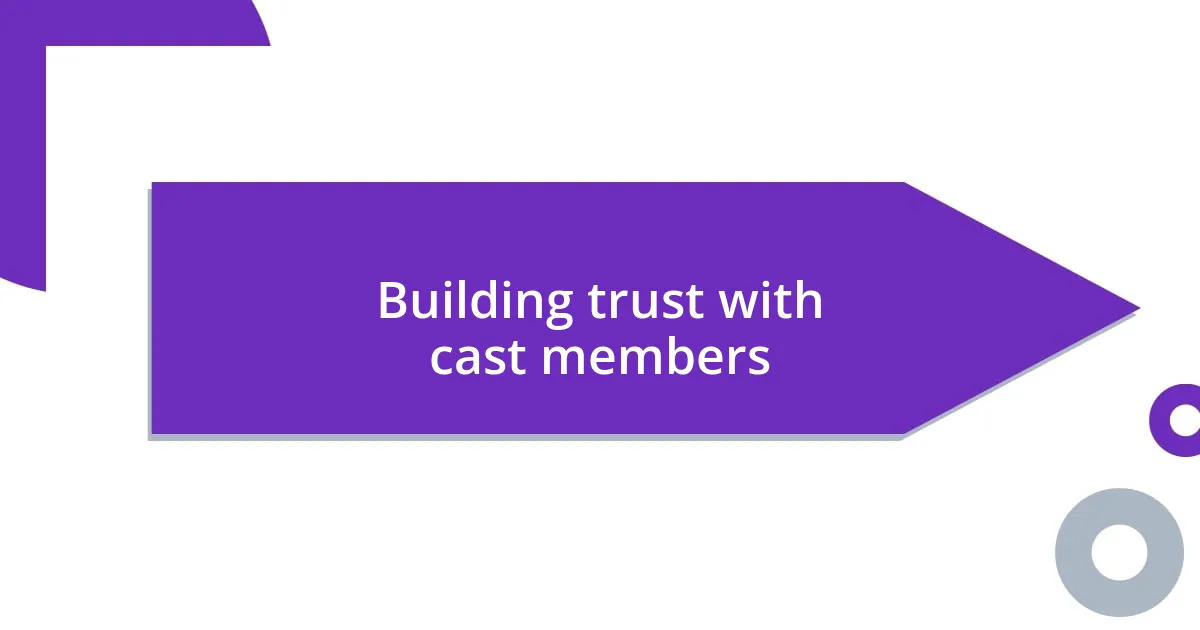
Building trust with cast members
Building trust with cast members is a cornerstone of effective collaboration. In my experience, trust is fostered through consistent and open communication. For instance, I once had a cast member who expressed anxiety about their performance. By making time to sit down and listen to their concerns, I could provide reassurance and share my own similar experiences. This simple act built a bridge of trust that allowed the actor to take creative risks, ultimately enhancing their performance.
Another key element of building trust is showing vulnerability myself. When I openly share my own challenges and uncertainties, it encourages cast members to do the same. Last year, during rehearsals for a challenging scene, I admitted my struggles with a particular direction I was giving. This created an atmosphere where everyone felt safe to voice their hesitations without fear of judgment, and as a result, we developed a shared understanding that strengthened our collective trust.
I’ve also learned that celebrating each other’s successes plays a vital role in reinforcing trust. Whether it’s a shout-out during rehearsals or a small celebration after a successful scene, these moments create a positive environment. I remember a time when one of my cast members achieved a significant breakthrough. Recognizing their achievement not only boosted their confidence but also reinforced the sense of unity and trust within the group. It’s these little gestures that weave a strong fabric of trust among cast members.
| Trust-Building Approach | Description |
|---|---|
| Open Communication | Encouraging dialogue and listening to concerns fosters connection. |
| Vulnerability | Sharing my own challenges encourages others to be open. |
| Celebrating Successes | Recognizing achievements strengthens unity and trust. |
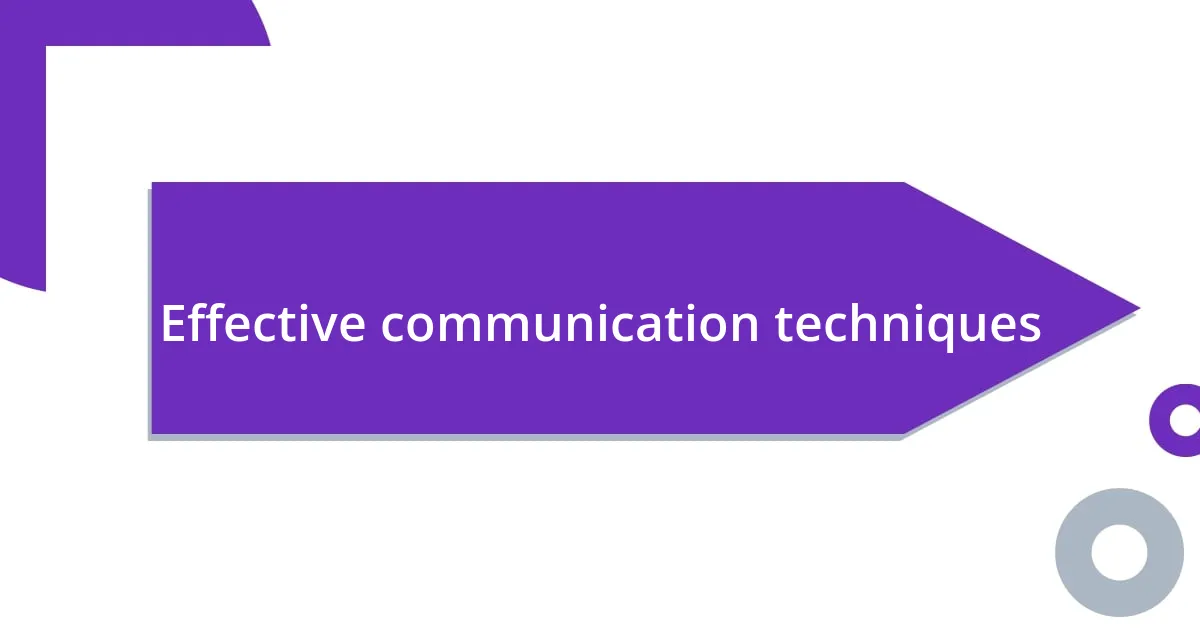
Effective communication techniques
Effective communication techniques
One effective communication technique I often rely on is active listening. It’s not just about hearing words; it’s about understanding the emotions behind them. During rehearsals, there was a moment when a cast member hesitated to share their thoughts on a scene. I leaned in, made eye contact, and nodded in understanding. This simple act encouraged them to express their ideas more freely, reinforcing the importance of being present and engaged in conversations with my cast.
Another technique involves using positive reinforcement. I remember a particularly intense rehearsal when a cast member nailed a challenging scene. Instead of simply moving on, I took a moment to acknowledge their effort with genuine praise. This not only made them smile but also inspired the rest of the cast to push their limits. Positive feedback creates a ripple effect, promoting an environment where everyone feels valued and motivated to contribute their best.
Here are a few effective communication techniques that I incorporate:
- Active Listening: Fully engaging in conversations shows that you value what others have to say.
- Positive Reinforcement: Acknowledging efforts and successes encourages confidence and creativity.
- Open-Ended Questions: Asking questions that require more than a yes or no answer sparks deeper discussions.
- Body Language: Non-verbal cues such as nodding or maintaining eye contact can significantly enhance connection.
- Regular Check-Ins: Taking time for quick one-on-one chats ensures everyone feels heard and supported.
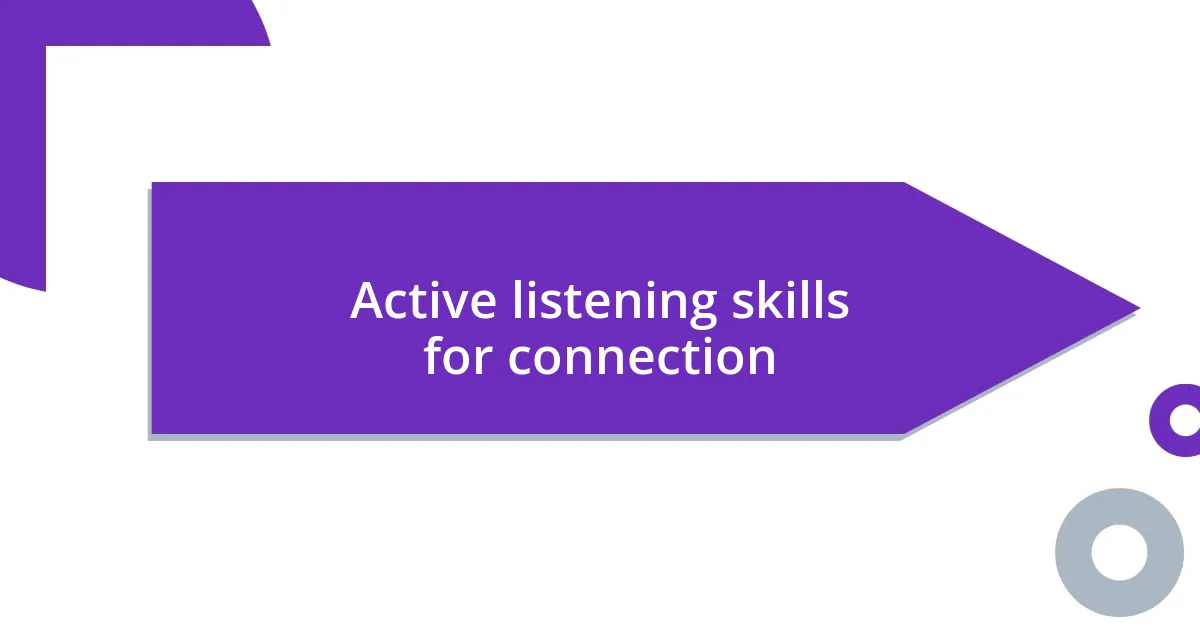
Active listening skills for connection
Active listening is a game changer in building connections with my cast. I recall one rehearsal where a particularly shy actor hesitated to voice their ideas. Instead of rushing them, I took a moment to pause and truly listen, leaning forward and offering my full attention. This simple gesture opened up a space where they felt comfortable expressing themselves; it transformed our collaboration and deepened our connection.
What I’ve discovered over time is that acknowledging non-verbal cues plays a crucial role in active listening. I remember a time someone seemed off during rehearsals. They weren’t verbally sharing their worries, but I noticed their fidgeting and lack of eye contact. By approaching them gently and asking how they were feeling, I was able to create an opportunity for them to share their concerns. In my experience, it’s often these quiet, non-verbal signals that can lead to the most meaningful conversations and ultimately strengthen our bonds.
Through my journey in theater, I’ve come to realize that active listening isn’t just a technique; it’s an emotional investment. When cast members feel truly heard, it fosters a sense of belonging. I strive to reflect back what I hear. For instance, saying things like, “It sounds like that scene made you really emotional,” not only validates their feelings but also leads to richer discussions about our work. Have you ever noticed how much more connected you feel when someone genuinely understands you? That’s the magic of active listening in action.
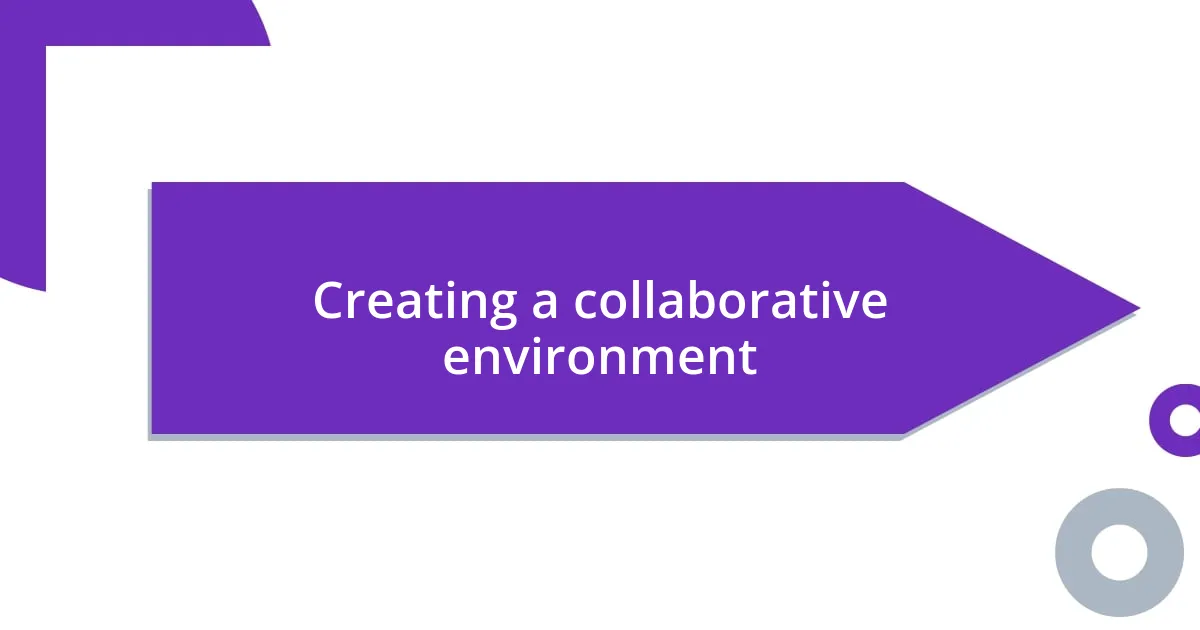
Creating a collaborative environment
Creating a collaborative environment starts with fostering a sense of trust among cast members. I remember during my last production, we held a series of team-building exercises before we even touched the script. We played improv games that not only helped break the ice but allowed everyone to see each other’s strengths and quirks. It’s remarkable how a little laughter can transform a group of strangers into a cohesive unit ready to tackle any scene together.
I’ve often found that encouraging open dialogue is crucial in a collaborative space. One time, I set aside a segment of our rehearsal to invite everyone to share their thoughts on the character developments. I was genuinely surprised when a quiet actor spoke up with a brilliant idea that shifted the dynamic of the whole scene. It made me realize how important it is to provide a platform where everyone feels their voice matters. By openly inviting input, we not only sparked creativity but also strengthened relationships, turning rehearsals into a shared journey rather than a solo mission.
In my experience, celebrating collective achievements enhances collaboration exponentially. At the end of one particularly grueling week of rehearsals, I suggested we have a small celebration. We shared our ups and downs over snacks, reminiscing about challenges we faced throughout the week. The camaraderie that developed that night was palpable—everyone left feeling more united and motivated. Have you ever noticed how a simple act of recognition can transform group dynamics? It’s those shared moments that build an unbreakable bond among cast members, making collaboration feel effortless and thrumming with energy.
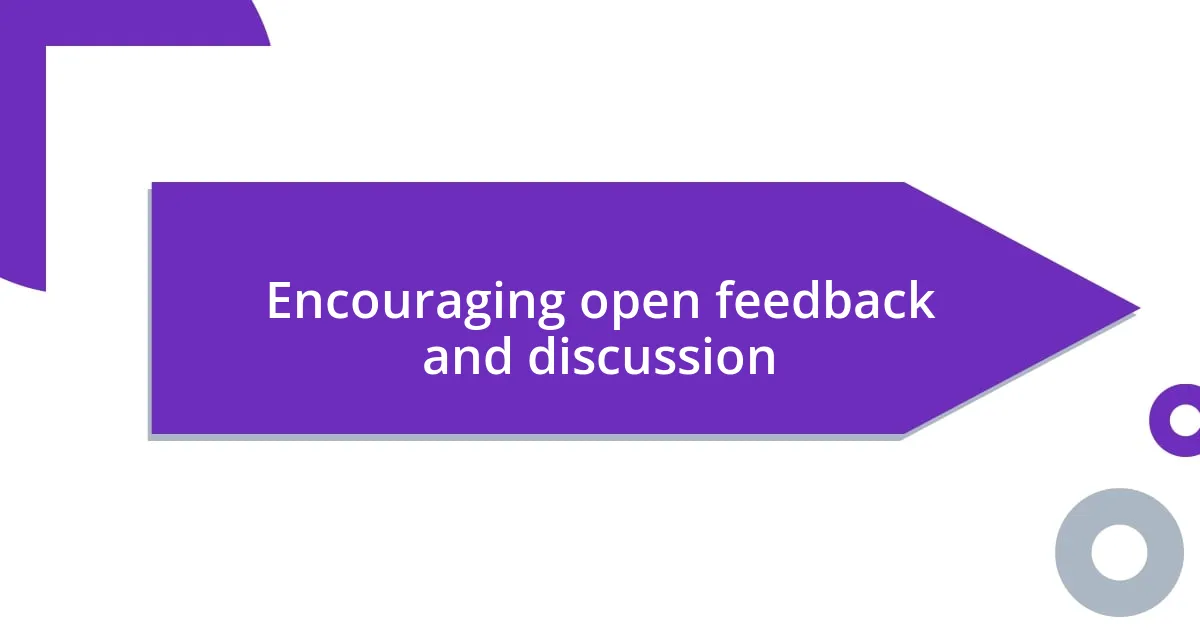
Encouraging open feedback and discussion
Encouraging open feedback is essential in my process. During one rehearsal, I decided to implement a roundtable discussion where everyone had the chance to share their thoughts on the staging. At first, I sensed hesitation, as if everyone was keeping a tight grip on their ideas. But as we circled around the table, I shared my own doubts and vulnerabilities about the scenes we were working on. I think this opened the floodgates—everyone started contributing, sharing their insights without fear of judgment. It was a beautiful moment of collective honesty.
One thing I’ve learned is that creating a feedback-friendly environment doesn’t happen overnight. I remember after a particularly challenging scene, I invited the cast to share what worked and what didn’t. Instead of jumping in with my own opinions, I allowed for silence, letting their thoughts emerge organically. That space encouraged someone to voice a concern that had been weighing on them. Their honesty not only led to improvements in our performance but also deepened trust among all of us. Have you ever felt a weight lifted when you could share your thoughts without reservation? It’s transformative.
To truly encourage open discussion, I also focus on how I respond to feedback. I try to practice gratitude when someone offers their perspective, no matter how trivial it may seem. During one rehearsal, a cast member pointed out a minor inconsistency in my directorial choices. Instead of brushing it off, I paused and thanked them for their insight. This simple act showed my cast that every opinion is valid and valued. It’s incredible how a bit of appreciation can catalyze further dialogue and make everyone more inclined to share their thoughts. In my experience, it’s those genuine exchanges that build a rapport stronger than just professional ties.
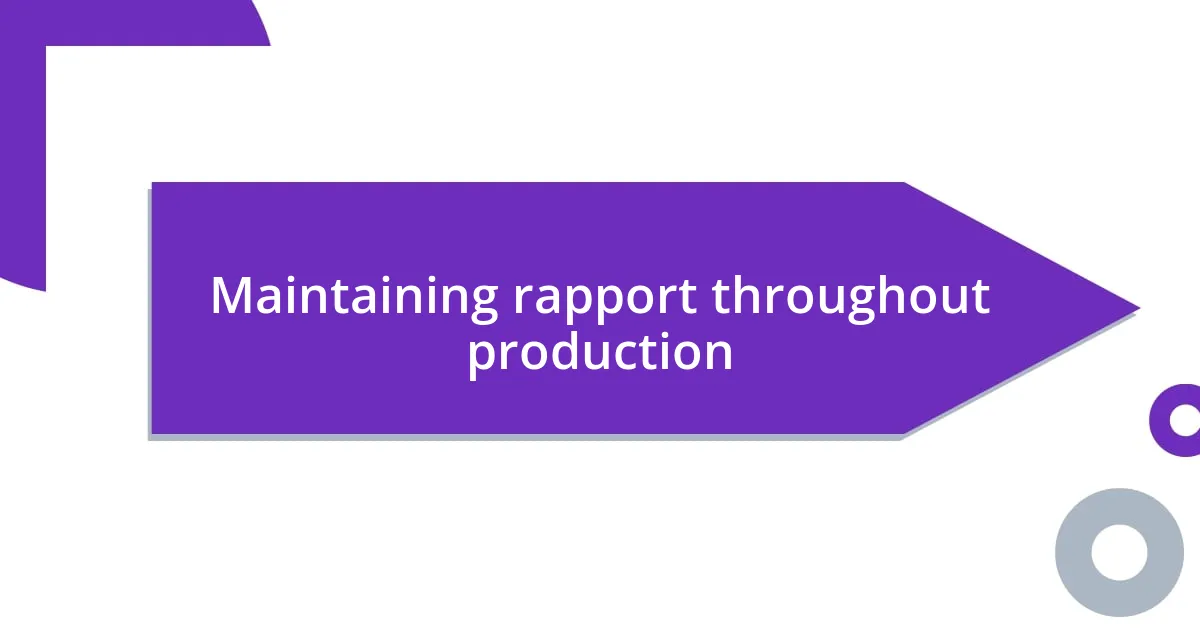
Maintaining rapport throughout production
Throughout production, maintaining rapport is essential, and I’ve discovered that consistent check-ins with the cast truly make a difference. After our first few rehearsals, I made it a point to mingle with everyone, even for just a moment, to gauge how they were feeling about their characters and the overall process. I’ll never forget one day when a usually energetic actor seemed a bit withdrawn. A simple inquiry about their well-being led to an enlightening conversation that unveiled some personal challenges they were navigating. It’s moments like these that remind me just how important it is to stay attuned to the emotional landscape of my cast.
As our rehearsals progressed, I initiated casual pre-rehearsal huddles where we could share triumphs or frustrations from the previous day. During one of these gatherings, an actress shared how an intimidating scene had made her feel vulnerable. That openness kicked off a heartfelt dialogue, drawing others into the circle to share their own apprehensions. It struck me in that moment how vulnerability, when acknowledged, can knit a group together far tighter than any script could dictate. Isn’t it fascinating how opening up can spark collective growth? I believe that such authenticity fuels not just trust but also motivation to fully invest in our shared goals.
I also find that incorporating humor is a powerful way to sustain rapport. One memorable day midway through the production, I decided to lighten the mood by throwing in a spontaneous group exercise—just a hilarious improv game before we dove into rehearsals. The laughter that ensued was contagious; it lifted everyone’s spirits and reminded us all that while we’re aiming for excellence, it’s equally crucial to enjoy the journey. Who doesn’t feel more connected to their teammates after a good laugh? In those light-hearted moments, I truly felt the bonds between us grow stronger, reflecting my belief that rapport flourishes not just through hard work but through joy shared along the way.
